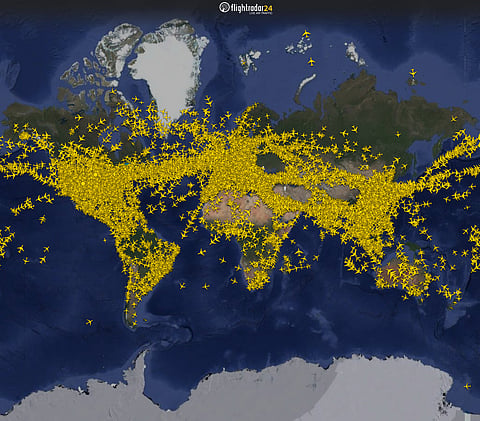Look: Flight trackers capture fully deserted airspace over Iran, Israel conflict zone
Airlines reroute amid Iran-Israel tensions; GPS jamming disrupts conflict-zone airspace

Dubai: Global flight patterns have changed dramatically amid rising tensions between Iran and Israel, with Flightradar24’s live data revealing a conspicuous void in airspace over the conflict zone.
The flight tracking platform, which monitors over 24,000 aircraft worldwide, reports that airlines are actively rerouting flights to avoid high-risk areas.
GPS jamming threatens flight tracking accuracy
Flightradar24 has also issued a warning about increased GPS jamming—common near conflict zones.
The platform explained that such interference can distort aircraft position data, leading to inaccuracies in the ADS-B tracking signals transmitted by planes operating in the region.
Airspace closures intensify disruptions
Iran’s Civil Aviation Organization has extended its airspace closure until 2:00 AM local time on Friday, as the confrontation with Israel enters its seventh day, according to state news agency IRNA. Simultaneously, Israel has shut its airspace to both incoming and outgoing flights following continued Iranian air raids. Authorities have advised passengers to avoid Ben Gurion Airport until further notice.
Widespread flight disruptions
Since the conflict began on June 13, air travel across the Middle East has been heavily disrupted. Airlines worldwide have suspended or rerouted flights due to security risks, with airports in Jordan, Iraq, the UAE, Syria, and Lebanon reporting widespread delays and cancellations. Many global carriers are now avoiding Middle Eastern airspace altogether, citing missile threats and military activity, as aviation authorities continue to urge extreme caution.
UAE flight cancellations
UAE airlines have extended flight suspensions and adjusted schedules as the Iran-Israel conflict continues to disrupt regional airspace. Air Arabia has suspended flights to Iran, Iraq, Russia, Armenia, Georgia, and Azerbaijan until June 30. Etihad Airways has rescheduled services to and from Beirut for June 21. Emirates has temporarily halted flights to Amman and Beirut until June 22, and to Tehran, Baghdad, and Basra until June 30. Flydubai has also suspended flights to Iran, Iraq, Israel, and Syria until the end of the month and will not accept connecting passengers to those destinations for now.
UAE travellers rethink summer holidays
As reported by Gulf News, a growing number of UAE-based travellers are postponing or cancelling summer holiday plans due to widespread flight disruptions caused by the Iran-Israel conflict. Travel agents report a surge in cancellations for Europe, the US, and Eastern Europe, as airspace closures over Iran, Iraq, Israel, and Jordan affect key transit routes.
Flight data shows rising cancellation rates on Dubai-bound flights from cities such as Karachi, Lahore, and Multan, along with increased delays on routes via Istanbul. With longer flight times and last-minute changes becoming common, many are opting to cancel trips amid growing uncertainty—despite reassurances from travel agents.
Sign up for the Daily Briefing
Get the latest news and updates straight to your inbox





